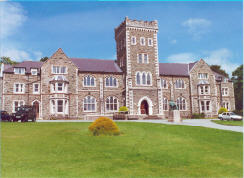Tom Nefyn Williams: A Warning from History 4: Broken Cisterns
 As we have seen, despite his time at Porth Bible School, Tom Nefyn was required to pass through the denominational colleges of the Presbyterian Church of Wales before he could be considered for a pastorate. By the time of his arrival in the early 1920s, the two colleges he attended, Aberystwyth Theological College (not to be confused with University College, my alma mater), and Bala, the senior college, were both hotbeds of Modernism. There, he would have imbibed the latest Higher Critical theories about the Bible, new psychological theories, and the Social Gospel.
As we have seen, despite his time at Porth Bible School, Tom Nefyn was required to pass through the denominational colleges of the Presbyterian Church of Wales before he could be considered for a pastorate. By the time of his arrival in the early 1920s, the two colleges he attended, Aberystwyth Theological College (not to be confused with University College, my alma mater), and Bala, the senior college, were both hotbeds of Modernism. There, he would have imbibed the latest Higher Critical theories about the Bible, new psychological theories, and the Social Gospel.In many ways, this should not have been surprising. By the 1890s, there was no place for truth in the theological colleges. Thomas Charles Edwards, son of the first Principal of Bala, first Principal of the University College at Aberystwyth, had in 1888 lamented the decline of theological knowledge among the laymen and the theologians of the Calvinistic Methodists. The Calvinism of John Jenkins, Hengoed, Charles Hodge and Shedd had been jettisoned in favour of a weak Arminianism mixed with the evolutionary theology of Henry Drummond. The key figure had been Andrew Martin Fairbain, Principal of Mansfield College, Oxford, the author of the theological curriculum of the University of Wales.
Fairbain's key text was The Place of Christ in Modern Theology (1893), which portrayed Christ as the pinnacle of Human evolution, the inspiration of the cry, 'back to Christ!' Even Thomas Charles Edwards was affected, his 1895 lecture, The God-Man (1895, English and Welsh) endorsing this view, and declaring that the incarnation would have been necessary, even without the Fall: "Exclude the Representative Man from nature," he stated, "the Son of God from creation, and the Universe has no ethical end and teleological purpose." [p.94] In addition, he had advocated a radical kenoticism in regard to the incarnation [p.104]. By Tom Nefyn's time, the truth had declined further.
Listening to such radical modernism from men with high-sounding titles and many degrees and publications, the young fundamentalist found that Porth had not equipped him to cope. Whatever resistance he may at first have manifested, Tom Nefyn drank deeply at the wells of modernism. By the time he was inducted to the ministerial Charge of Ebenezer, Tumble, in East Carmarthenshire, Tom Nefyn had become conformed to the modernist spirit of the age.
Part five will look at Tom Nefyn's ministry.
Labels: Tom Nefyn Williams

1 Comments:
Interesting work there... Keep it up.
Post a Comment
<< Home